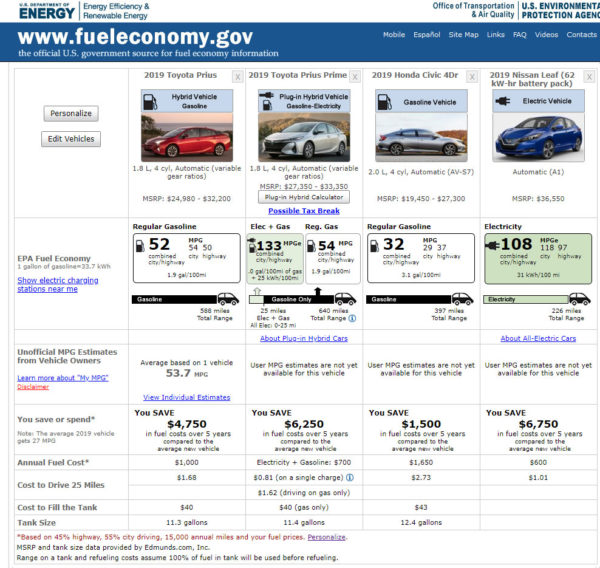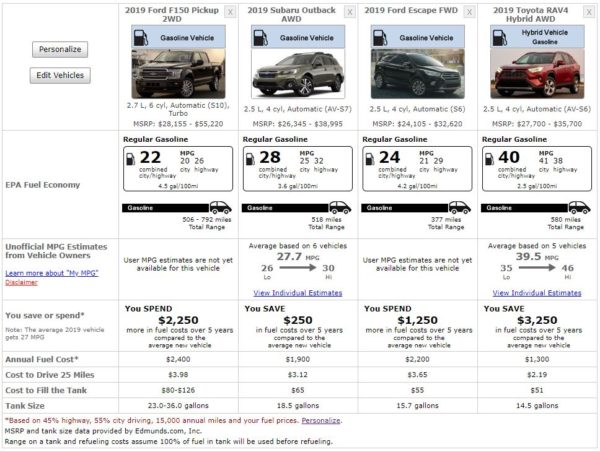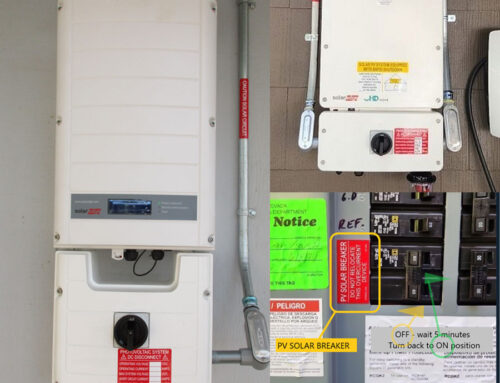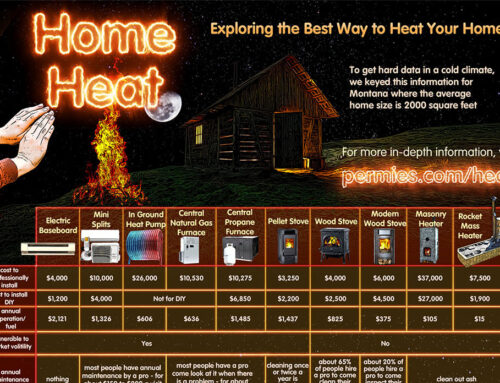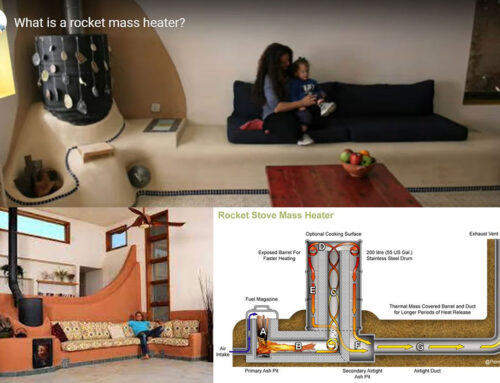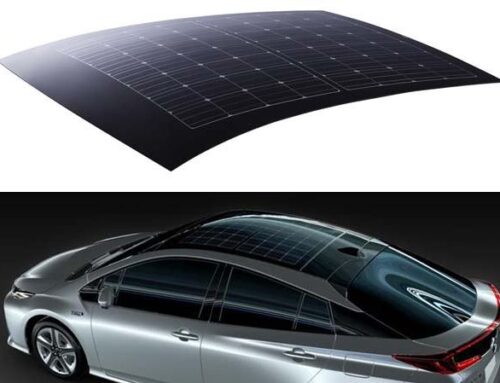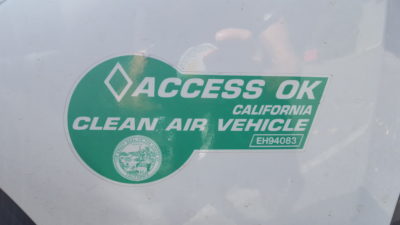

Electric vs Hybrid vs Combustion Vehicles
What’s the best choice and why does it matter?
With all the new types of propulsion options for vehicles on the market it can be confusing as to which is the best choice. What are the differences between conventional Combustion engines, Hybrids, Plugin Hybrids, and Electric Vehicles?
This article will cover the differences of each type of vehicle and recommend what choice might be best for your pocket and the environment.
Fun Fact to consider:
The most efficient truck will peak around 25 miles per gallon
The most efficient car can get 136 miles per gallon! In comparison, choosing a the car instead of a truck would result in a net savings of $8,500 in gas every 5 years. (read more to find out how we got these numbers)
What are the differences in vehicle types?
First Gear…
1. Internal Combustion Engine or ICE : A typical “conventional” type of vehicle.
Burns only gasoline or diesel to move the vehicle.
Pros: After reading the rest of this article you will find, in comparison, the pros are not evident.
Cons: Burns the most gasoline per mile.
Why does it matter to limit burning gasoline and diesel?
Cost per mile when using hybrid and/or electric is significantly cheaper.
Without hybrid technology or battery power, these vehicles burn the most gas per mile, therefore creating the most air, water, and land pollution out of the 4 types of vehicles. Read more about what is in tailpipe smoke here ->
The birth of a new metric instead of Miles per Gallon:
Now that we are plugging in our vehicles and using electricity to power them, we have to use a different metric than miles per gallon. Instead of miles per gallon, cost per mile is a becoming the better metric when comparing vehicle efficiency. [See this metric in action by comparing cost per mile at www.fueleconomy.gov]
Using that new metric:
Average cost to drive 25 miles (at $3.50/gallon) for a Honda Civic Internal Combustion Engine: $2.73
While that might sound good, compare those numbers to some other vehicles below.
Fuel and Energy Efficiency for some larger vehicles, like SUV’s and Truck
Second Gear…
2. Hybrid – HEV: A mix of combustion and electric engines that speak to each other with the use of technology and sensors.
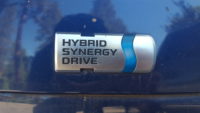

 Burns less gasoline while also using a technology called regenerative braking that charges a battery, which in turn powers the car while driving and idling.
Burns less gasoline while also using a technology called regenerative braking that charges a battery, which in turn powers the car while driving and idling.
Pros: Higher miles per gallon and lower cost per mile
A Con now turned Pro: Battery recycling and re-use programs are growing, and plans are in place to put older batteries to other uses, like charging stations, backup power for stores in emergencies and more.
Con: Still burns gasoline, although less than a vehicle with only a conventional combustion engine.
In conclusion: Through the synergy of electric engines and combustion engines, cars, SUVs and now trucks have significantly higher fuel efficiency than their conventional counterparts, without a big increase in cost of the actual vehicle.
Simply put: Hybrid vehicles essentially charge themselves as they drive.
*EVERY VEHICLE SHOULD AT LEAST BE A HYBRID FROM THIS POINT FORWARD OF HUMAN EXISTENCE.
Average cost to drive 25 miles for a Hybrid Toyota Prius: $1.68
Care to learn a little about regenerative braking and hybrid systems? Check out this simple video on this game-changing transportation technology.
Third gear…
Plugin Hybrid Electric Vehicle – PHEV: Using a larger battery than its non-plugin hybrid counterparts this type of vehicle is meant to be charged by electricity while also using regenerative braking and movement of the vehicle to charge while driving.
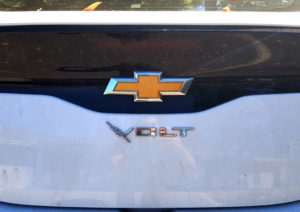


Plugin hybrids also have a combustion engine and use very little gasoline compared to regular Hybrids due to their larger battery bank.
Pro: It is possible to not burn any fuel on a short distance trip using only the battery to power the vehicle. Non-plugin hybrids do not have a large enough battery to accomplish this.
Plugin Hybrids have highest range of all vehicles.
Con: Although a lot less fuel is used, a combustion engine still present.
Plugin Hybrids are a smarter alternative to a regular combustion engine vehicles as they use the best combination of hybrid, electric and combustion technologies. The battery is used for short trips and the combustion engine kicks in when on longer trips, while also using hybrid regenerative charging while driving.
Average cost to drive 25 miles for a Plugin Hybrid Toyota Prius Prime: $.81
Forth Gear…
Electric Vehicle – EV: A vehicle without a combustion engine and a big battery bank. This vehicle’s range is controlled by the capacity and charge of the battery.
Most, if not all new electric vehicles, have enough range for regular use and charging stations are available nationwide.
As batteries and technologies are currently enough to satisfy most human driving patterns and with advancements happening every day the Electric Vehicle is set to become the preferred way to transport humans, goods and services. Because they do not rely on the combustion of gasoline, Electric Vehicles are a cleaner and more intelligent system of transport.
Average cost to drive 25 miles for a Nissan Leaf: $1.01
High Gear…
Some food for thought in the comparison of electric vs hybrid vs combustion engines vehicles:
- With an any electric vehicle you are plugging in to charge the battery of your vehicle. What source you plugin to plays a big role in your vehicle’s sustainability factor.
- If you have a home solar energy system you could be charging your plugin vehicles with 100% clean renewable energy.
- If you are connected to the grid then the power you get will be based on the energy portfolio of the utility company giving you power.
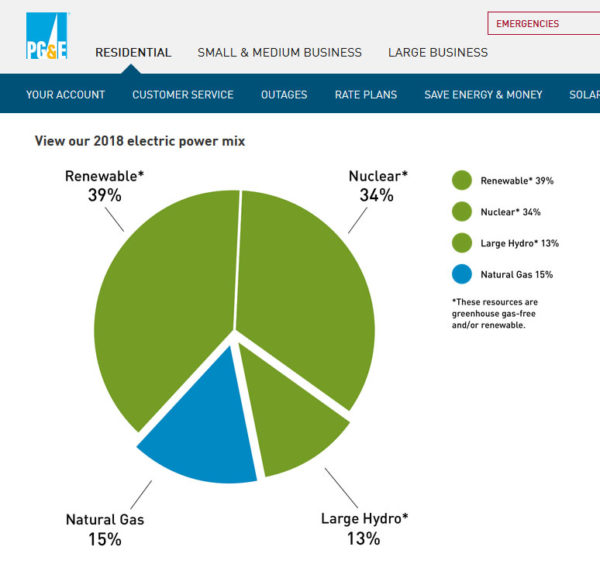


- Range in newer electric vehicles is no longer a concern based on normal driving patterns.
“Driving a car or SUV that with only a combustion engine is simply no longer the right choice for your pocket and the sustainability of our planet. Please tell you family and friends, it’s not a sensible idea to buy a regular vehicle anymore. The time for old combustion engine technology is over.” – Harry at SEG
—
Winning combinations:
Home Solar with an Electric Vehicle = Best
Home Solar with a Plug-In Hybrid Vehicles = Next Best
Energy from the Grid + Electric Vehicle = Also good!
Hybrid Electric Vehicle = HUGE improvement over a regular combustion engine vehicle
In the interest in saving money and the environment, why would one not choose one of these winning combinations over an stand-alone internal combustion engine vehicle?
—
At Sustainable Energy Group we believe in the seeing the whole picture.
Not all technology is perfect when it comes to the manufacturing and use of batteries as well as with solar panels and wind. But to our knowledge these are the best and most viable technologies we can implement right now.
What will be done after all of these batteries in Hybrids and Electric vehicles cannot be used? That is a valid question and fortunately programs are growing rapidly in anticipation of this waste. Batteries often still hold enough charge to be useful even after they are used in vehicles and that has value in our marketplace where batteries are like the new gold. Technologies are also being developed to mitigate the effects of mining for these technologies and the future looks bright.
Solar panels have embodied energy in their creation but that is offset by their first 1-2 years of producing clean energy. Solar panels like batteries over long periods of time can still produce energy and are being re-used and recycled with great benefit.
In all types of solutions, it is important to consider the whole picture. After comparing all energy producing technologies we believe especially in California, solar power is the better sustainable solution than burning fossil fuels.
Please let us know what you think. Join or start a conversation with your community, family and friends about the benefits and intelligence of Hybrid and Electric Vehicles coupled with of Solar Energy in the equation of a clean energy future for all.


